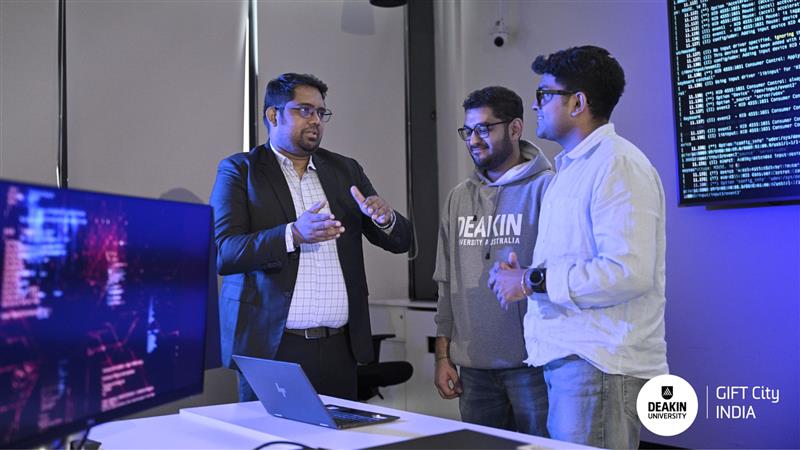In the ever-evolving battlefield of cyberspace, every data packet tells a story of innovation, intrusion, and intelligence. At Deakin University’s GIFT City Campus, Dr Hridoy Sankar Dutta, Lecturer in Cybersecurity, is decoding those stories and equipping the next generation of cyber defenders to rewrite them.
Before joining Deakin, Dr Hridoy was a Research Associate at the University of Cambridge in the UK, working at the Cambridge Cybercrime Centre on how cybercriminals operate in hidden online ecosystems, from underground forums to black-market app marketplaces. His journey started at IIIT Delhi, where his PhD research focused on detecting collusive activities in online media, pioneering the fields of cybersecurity, social networks, and data science. Hridoy earned several awards, including the Cambridge Wiseman Prize (2023), DAAD AInet Fellowship (2023), and the University of Chicago Rising Star in Data Science Award (2021), for his research at the intersection of cybersecurity and social computing.
“What drew me to cybersecurity,” he says, “was the human factor; how social behaviour and technical vulnerabilities intertwine in cybercrime. My goal was to understand how malicious entities think, so we can teach systems and even people to think smarter.”
Turning research into real-world readiness
At Deakin’s India campus, Dr Hridoy brings the same investigative spirit into the classroom. His teaching connects AI, data science, and cyber forensics to real-world challenges from adversarial AI and deepfake detection to AI-driven threat intelligence.
“Students work with live threat datasets and open-source intelligence tools,” he explains. “They learn to analyse attacker patterns, simulate phishing and ransomware scenarios, and design defences aligned with frameworks like NIST and ISO 27001. It’s hands-on, high-impact learning.”
This data-driven approach reflects Deakin’s hallmark philosophy of learning through doing, where students move beyond theory to co-author research papers, build cybersecurity tools, and contribute to live projects in cutting-edge areas such as voice authentication, social network security, and web vulnerability analysis.
GIFT City: Where learning meets the real threat landscape
Gujarat International Finance Tec-City, India’s international financial and technology hub, provides the perfect testbed for this kind of learning. With global banks, fintech startups, and multinational firms operating side-by-side, cybersecurity isn’t theoretical; it’s a daily operational necessity.
“Our students learn in one of the world’s most digitally advanced ecosystems,” Dr Hridoy notes. “They are not studying attacks in isolation; they are understanding how to protect real financial systems, prevent fraud, and secure the future of digital commerce.”
Deakin’s global network also ensures exposure beyond India. Students engage in joint projects with Deakin Australia, access internship opportunities, and access world-class labs and research resources, gaining a 360° view of how cybersecurity operates across borders.
AI, ethics, and the future of cyber careers
As the world becomes increasingly digital, the need to protect it has never been greater. With cybercrime projected to cost $10.5 trillion by 2025, cybersecurity is now one of the most in-demand and future-proof careers globally.
In 2023, the global cybersecurity workforce grew to 5.5 million, yet the world still needs over 4 million more professionals, with the Asia–Pacific region leading this demand. This global talent gap is opening doors for skilled graduates ready to take on high-impact roles at the intersection of technology, ethics, and innovation.
Deakin’s Cybersecurity program at GIFT City equips students to lead this transformation. They train for emerging roles such as AI threat analysts, digital forensics experts, and cyber policy leaders, gaining hands-on experience through research-led teaching, live industry projects, and global exposure.
Empowering tomorrow’s defenders
At Deakin’s GIFT City Campus, students don’t just learn how to respond to threats; they learn how to predict, prevent, and lead in an AI-driven digital future. It’s where curiosity meets purpose and where the next generation of cyber defenders begins their journey
“Cybersecurity is not a job; it is a mission,” says Dr Hridoy. “Every line of code, every data model you build, can protect a person, a business, or even a nation.”

